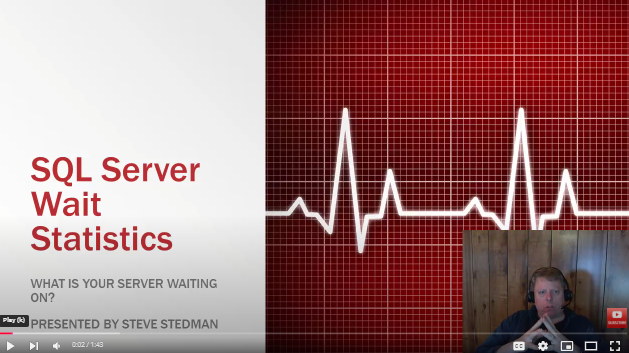Wait statistics, in the context of SQL Server, refer to the amount of time that a query spends waiting to access data in the database. When a client application requests data from the database, the request is placed in a queue and the client application must wait for its turn to access the data. The time that the query spends waiting is called a "wait" and is tracked by SQL Server. This information can be used to identify potential performance bottlenecks and optimize the performance of the database. Wait statistics are commonly used by database administrators to diagnose and troubleshoot performance issues in SQL Server.
In SQL Server, certain wait types indicate the database engine is waiting on external processes or the operating system to complete tasks. One such wait type is PREEMPTIVE_OS_DTCOPS, which is related to the Distributed Transaction Coordinator (DTC). Understanding this wait type can help you optimize distributed transaction performance in your SQL Server environment.
What is PREEMPTIVE_OS_DTCOPS?
The PREEMPTIVE_OS_DTCOPS wait type occurs when SQL Server is waiting for the operating system to complete an operation involving the Distributed Transaction Coordinator (DTC). The DTC handles distributed transactions, which span multiple resource managers like databases across different servers or systems. This wait type reflects the time SQL Server spends waiting on the DTC for tasks such as starting, committing, or rolling back distributed transactions.
In simpler terms, this wait type means SQL Server is relying on the DTC to handle a distributed transaction, and its waiting for the OS to complete its part of the process. While occasional waits are expected in systems using distributed transactions, frequent or prolonged waits could indicate an issue with the DTC or network configuration.
Why Does PREEMPTIVE_OS_DTCOPS Happen?
Several factors can lead to PREEMPTIVE_OS_DTCOPS waits, including:
- Network latency or unreliable connections between systems involved in the distributed transaction.
- Delays in the Distributed Transaction Coordinator service itself, such as misconfigurations or resource constraints.
- High transaction volume overwhelming the DTC or the SQL Server instance.
- Timeouts or communication failures between SQL Server and the DTC.
- Insufficient hardware resources on servers participating in the distributed transaction.
Understanding these factors can help identify and resolve the root cause of this wait type.
How to Monitor PREEMPTIVE_OS_DTCOPS Waits
To track PREEMPTIVE_OS_DTCOPS waits effectively, using a tool like Database Health Monitor is highly recommended. Its Historic Waits Monitoring feature allows you to analyze when and how often these waits occur, helping you correlate them with specific distributed transactions or workloads.
By monitoring these waits over time, you can identify patterns and determine whether they are tied to particular applications, workloads, or network conditions.
What Can You Do About PREEMPTIVE_OS_DTCOPS Waits?
If you’re experiencing frequent or prolonged PREEMPTIVE_OS_DTCOPS waits, consider the following actions:
- Verify the configuration and health of the Distributed Transaction Coordinator service on all participating systems.
- Ensure network connections between servers are reliable, with low latency and sufficient bandwidth.
- Optimize workloads to minimize unnecessary distributed transactions.
- Increase hardware resources such as CPU and memory on systems managing distributed transactions.
- Review and tune timeout settings for distributed transactions to align with workload requirements.
These measures can help you minimize this wait type and improve the overall efficiency of distributed transactions in your SQL Server environment.
How Stedman Solutions Can Help
At Stedman Solutions, we specialize in SQL Server performance tuning and troubleshooting, including resolving issues related to wait types like PREEMPTIVE_OS_DTCOPS. Our managed services offer expert support and proactive monitoring to optimize your SQL Server environment. Additionally, our Database Health Monitor provides powerful tools for tracking and analyzing SQL Server waits, helping you maintain a reliable and high-performing database system.
If distributed transactions or wait types are causing performance issues, contact us today. Let us help you achieve a fast, reliable, and efficient SQL Server environment!

Find out more about our SQL Server Managed Services
Applies to
Related Waits
PREEMPTIVE_COM_CREATEACCESSORPREEMPTIVE_COM_GETDATA
PREEMPTIVE_COM_QUERYINTERFACE
PREEMPTIVE_COM_RELEASE
PREEMPTIVE_COM_RELEASEROWS
PREEMPTIVE_COM_SEQSTRMREAD
PREEMPTIVE_COM_SETPARAMETERINFO
PREEMPTIVE_COM_SETPARAMETERPROPE
PREEMPTIVE_DTC_BEGINTRANSACTION
PREEMPTIVE_FILESIZEGET
PREEMPTIVE_HADR_LEASE_MECHANISM
PREEMPTIVE_OLEDB_RELEASE
PREEMPTIVE_OLEDBOPS
PREEMPTIVE_OS_AUTHENTICATIONOPS
PREEMPTIVE_OS_AUTHORIZATIONOPS
PREEMPTIVE_OS_AUTHZGETINFORMATIO
PREEMPTIVE_OS_AUTHZINITIALIZECON
PREEMPTIVE_OS_AUTHZINITIALIZERES
PREEMPTIVE_OS_BACKUPREAD
PREEMPTIVE_OS_CLOSEHANDLE
PREEMPTIVE_OS_CLUSTEROPS
PREEMPTIVE_OS_CREATEFILE
PREEMPTIVE_OS_CRYPTACQUIRECONTEX
PREEMPTIVE_OS_CRYPTIMPORTKEY
PREEMPTIVE_OS_CRYPTOPS
PREEMPTIVE_OS_DELETEFILE
PREEMPTIVE_OS_DEVICEIOCONTROL
PREEMPTIVE_OS_DEVICEOPS
PREEMPTIVE_OS_ENCRYPTMESSAGE
PREEMPTIVE_OS_FILEOPS
PREEMPTIVE_OS_FLUSHFILEBUFFERS
PREEMPTIVE_OS_GENERICOPS
PREEMPTIVE_OS_GETCOMPRESSEDFILES
PREEMPTIVE_OS_GETDISKFREESPACE
PREEMPTIVE_OS_GETFILEATTRIBUTES
PREEMPTIVE_OS_GETFINALFILEPATHBY
PREEMPTIVE_OS_GETPROCADDRESS
PREEMPTIVE_OS_LIBRARYOPS
PREEMPTIVE_OS_LOADLIBRARY
PREEMPTIVE_OS_LOGONUSER
PREEMPTIVE_OS_LOOKUPACCOUNTSID
PREEMPTIVE_OS_MOVEFILE
PREEMPTIVE_OS_NETVALIDATEPASSWOR
PREEMPTIVE_OS_PIPEOPS
PREEMPTIVE_OS_QUERYREGISTRY
PREEMPTIVE_OS_REPORTEVENT
PREEMPTIVE_OS_REVERTTOSELF
PREEMPTIVE_OS_SECURITYOPS
PREEMPTIVE_OS_SERVICEOPS
PREEMPTIVE_OS_SQLCLROPS
PREEMPTIVE_OS_VERIFYTRUST
PREEMPTIVE_OS_WAITFORSINGLEOBJEC
PREEMPTIVE_OS_WRITEFILEGATHER
PREEMPTIVE_SERVICE_CONTROL_MANAGE
PREEMPTIVE_SERVICE_CONTROL_MANGE
PREEMPTIVE_SHAREDMEM_GETDATA
PREEMPTIVE_XE_CALLBACKEXECUTE
PREEMPTIVE_XE_GETTARGETSTATE
PREEMPTIVE_XE_SESSIONCOMMIT
PREEMPTIVE_XE_TARGETFINALIZE
PREEMPTIVE_XE_TARGETINIT
See Also
All Wait Types


